Canada has become the third country in the world to authorize the use of the COVID-19 vaccine from Pfizer and BioNTech, joining the United Kingdom and Bahrain.
In a giant step in the lead-up to what Prime Minister Justin Trudeau said on Monday would be the largest mass vaccination in the county’s history, Health Canada approved the vaccine today, following a two-month review.
“The data provided supports favourably the efficacy of Pfizer-BioNTech COVID-19 vaccine as well as its safety,” Health Canada said in its report.
“The efficacy of the vaccine was established to be approximately 95 per cent. The vaccine was well tolerated by participants and has no important safety concerns. The benefit-to-risk assessment for Pfizer-BioNTech COVID-19 vaccine is considered favourable.”
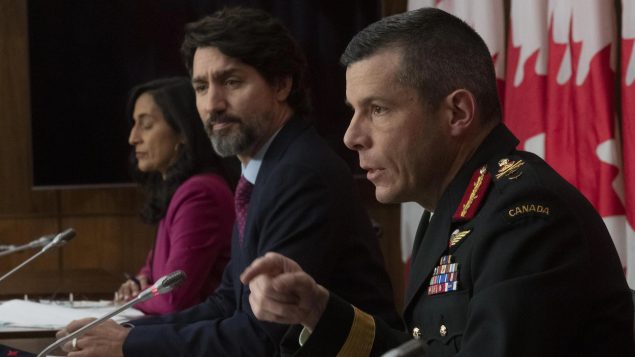
Maj.-Gen. Dany Fortin, pictured at a press conference in Ottawa on Monday with Public Services and Procurement Minister Anita Anand and Prime Minister Justin Trudeau, said Wednesday it is “totally possible” some Canadians could get their shots by the middle of next week. (THE CANADIAN PRESS/Adrian Wyld)
Maj.-Gen. Dany Fortin, who is in charge of distribution logistics, said he expects an initial run of 30,000 doses to be shipped from a plant in Puurs, Belgium on Friday.
“We expect vaccines to arrive as early as Monday,” said Fortin, who added that it was “totally possible” some Canadians could get their shots by mid-week.
Canada is scheduled to receive four million doses of the Pfizer vaccine by March, including up to 249,000 doses, as soon as next week.
In all, the federal government has purchased 20 million doses of the two-dose vaccine.
It also has an option to buy 56 million more doses.
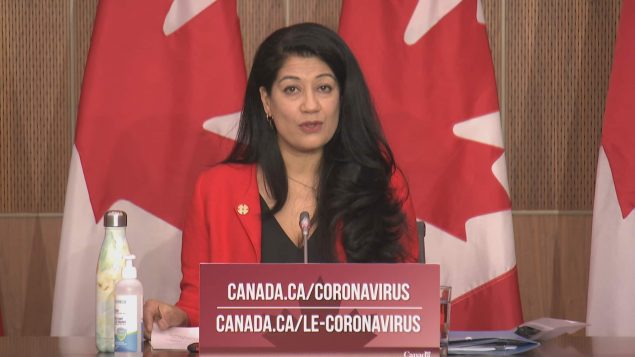
Dr. Supriya Sharma, Health Canada’s chief medial advisor, called today’s Pfizer approval ‘an exceptional day for Canada.’ (CBC News)
“It’s a testament to the work of regulators internationally,” said Dr. Supriya Sharma, Health Canada’s chief medical advisor, said today.
“It’s an exceptional day for Canada.”
On Monday, Canada, which already has enough vaccines secured to protect a population four times its size–the most of any country in the world–ordered an additional 20 million doses from Moderna, bringing its confirmed order commitment to 40 million doses from the Massachusetts-based pharmaceutical giant.
Today’s Health Canada approval followed a hectic Tuesday for Canadian politicians and health officials–a day when the federal intergovernmental affairs minister, Dominic LeBlanc, downplayed the importance of an executive order U.S. President Donald Trump signed earlier in the day–that–theoretically, at least–could limit how many doses of the Pfizer vaccine Canada might receive.
The order was ostensibly aimed at ensuring that the U.S. government obtains enough COVID-19 vaccine doses to inoculate Americans who chose to get vaccinated before sharing any of the supply with other countries or international entities.
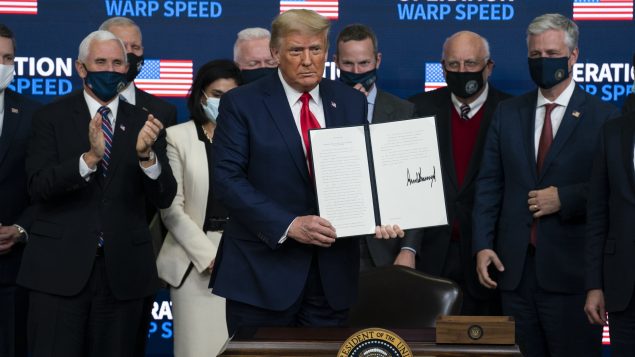
U.S. President Donald Trump displays his executive order on vaccine distribution during an “Operation Warp Speed Vaccine Summit” on the White House complex on Tuesday in Washington. Canadian officials said they were confident the exective order would not affect the distribution of the Pfizer vaccine in Canada. (AP Photo/Evan Vucci)
LeBlanc told reporters in Ottawa he was “confident” Pfizer would be able to fulfil its contractual obligations to deliver millions of vaccine doses to countries around the world.
“With respect to the Pfizer doses, we expect them to start arriving in the coming days, in the next week or so,” LeBlanc told reporters at a COVID-19 briefing.
“We have no reason to think whatsoever that access to the Pfizer vaccine will be in any way disturbed. Deliberately, in the contracts themselves, we contemplated having access to production facilities on more than one continent.”
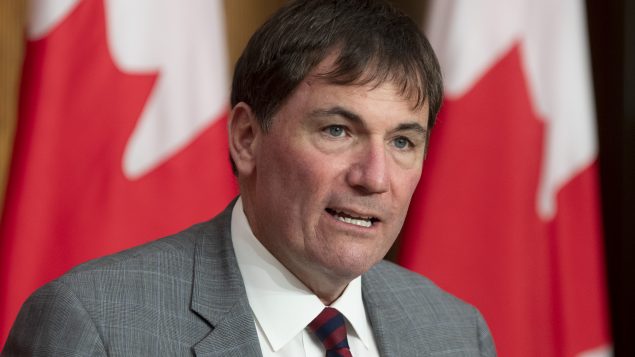
Intergovernmental Affairs Minister Dominic LeBlanc, pictured at a news conference on October 6 in Ottawa, said Tuesday he was ‘confident’ Pfizer would be able to fulfil its contractual obligations to deliver millions of vaccine doses to countries around the world, including Canada. (THE CANADIAN PRESS/Adrian Wyld)
A Pfizer spokesperson echoed LeBlanc’s optimism, telling CBC News that the company is “committed to honouring our agreements” with Canada and countries have “a number of procurement routes to rapidly secure vaccine supply.”
“We are a global company that prioritizes patients all over the world. Pfizer and BioNTech are committed to bringing this vaccine candidate to help meet the global public health need. We will work closely with international initiatives, governments and other vaccine manufacturers, as appropriate,” the spokesperson said.
Also on Tuesday, Canada’s chief public health officer, Dr. Theresa Tam, called distribution plans a “rapidly evolving situation,” saying the first doses of the vaccine will likely be given only to people who can physically be at one of the 14 delivery sites identified by provincial governments for the first arrivals of the vaccine.
Her comments came as the Canadian military continued to carry out distribution rehearsals.
And, the CBC’s John Paul Tasker reported, the vaccines Canadians receive will very likely not be coming from the U.S.–making Trump’s executive order moot–at least in terms of delivery to Canada.
Quoting an unnamed Canadian government official, Tasker reported that that most–if not all–of Canada’s initial supply of the Pfizer vaccines will be coming from a Belgium plant that will be supplying Europe, Canada, Japan and the U.K. in the coming months.
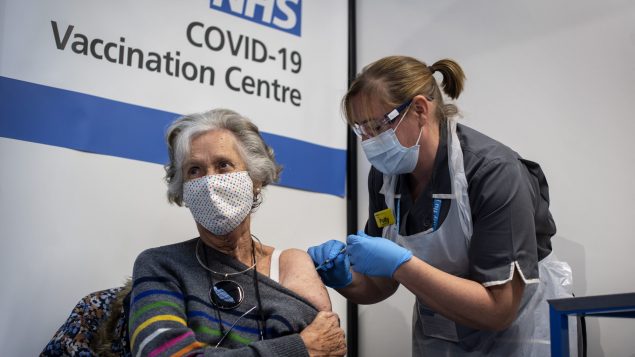
Dr. Doreen Brown, 85, receives the first of two Pfizer/BioNTech COVID-19 vaccine jabs administered at Guy’s Hospital in London on Tuesday, the first day of innoculations in the U.K. (Victoria Jones/Pool via AP)
Tasker’s reporting appeared to be confirmed by Maj.-Gen. Fortin.
“We’re exercising a dry run this week. Boxes are in the air right now,” Fortin said.
“They left Belgium and are on their way to the next transit node in the cold chain. They’re being monitored, so we will learn.”
“This is one way this week where we will learn how the process will flow, if adjustments need to be made.”
Tasker reports that the Public Health Agency of Canada plans to begin immunizing non-priority populations.
Early immunizations will target the elderly, health care workers and some adults in Indigenous communities, while non-priority populations will begin to get their shots in April.
The campaign is expected to run to next December.
With files from CBC News (John Paul Tasker, Thomson Reuters) The Canadian Press (Mia Rabson)







For reasons beyond our control, and for an undetermined period of time, our comment section is now closed. However, our social networks remain open to your contributions.